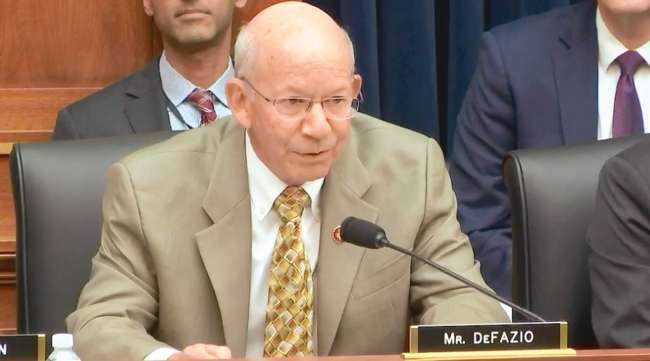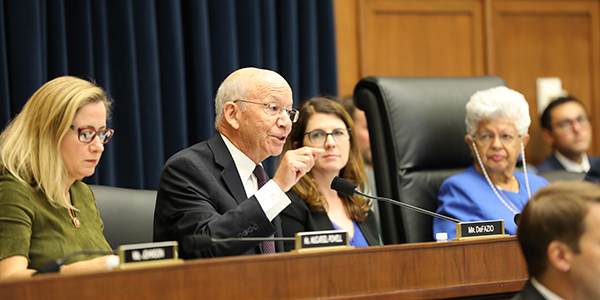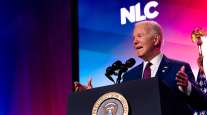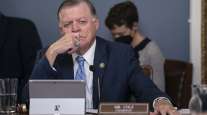Senior Reporter
DeFazio: House Transportation Panel Likely to Take Up Highway Bill Early Next Year

[Stay on top of transportation news: Get TTNews in your inbox.]
WASHINGTON — The transportation committee in the U.S. House of Representatives is likely to consider a long-awaited highway bill early next year, Rep. Peter DeFazio, the chamber’s top transportation policymaker, said in an exclusive interview with Transport Topics.
The legislation’s timing would depend on the committee’s pace this fall evaluating potential provisions related to climate resilience, autonomous technology and efforts to improve fuel efficiency, among others. The bill’s objective, DeFazio explained, would be transitioning from the Eisenhower-era concept of highways to a new framework that embraces modern technology.
The Oregon Democrat and chairman of the Transportation and Infrastructure Committee spoke from his quaint Capitol Hill office — decorated with Pacific Northwest memorabilia and frames of idyllic vistas — on Sept. 19, nearly two months after his Senate counterparts passed key aspects of the first major highway bill in the Trump era.
“We’re not rushing the bill. There’s no reason, absent new funding, to rush the bill. And we’re beginning drafting parts of it now, and we’re also continuing to meet with stakeholders,” DeFazio said. “I would hope we’ll be far along by the end of the year and could mark up a bill early next year. Then it goes to Ways and Means [tax-writing committee] for funding.”
WANT MORE NEWS? Listen to today's Daily Briefing
Senate committees that oversee freight and the country’s premier highway funding account have yet to incorporate their proposals into that chamber’s highway bill. The Senate’s inaction is influencing the pace in the House.
The funding question notwithstanding, another obvious hurdle for advancing infrastructure policy is the state of politics in the country. House Speaker Nancy Pelosi (D-Calif.) on Sept. 24 announced a formal impeachment inquiry of Donald Trump, likely paralyzing negotiations between the parties.
Still, broad agreement exists on Capitol Hill that a comprehensive update of the country’s infrastructure landscape would pave the way for greater freight connectivity and other improvements in small towns and large cities. Yet policymakers disagree on which sustainable source of funding to apply for an infrastructure measure.
The Highway Trust Fund, the federal standard for assisting states with surface transportation maintenance, is backed by insufficient revenue collected from the gas and diesel tax. The account’s current funding authorization expires in the fall of 2020. Stakeholder groups continue to urge Congress to raise and index the fuel tax, a proposition deemed politically radioactive by many Hill lawmakers. DeFazio has noted American Trucking Associations’ proposal of adopting a 20-cents-per-gallon fee on motor fuels collected at the wholesale rack and phased in over four years at 5 cents annually. And, he is unconvinced a vote to slightly raise the tax would be perilous.
“There’s always a lot of weak knees in Washington,” DeFazio said. “People want to get out of congestion. They’re tired of blowing out tires and getting out of alignment in potholes. I mean, the American people get it.”

DeFazio makes a point during a recent hearing. (Committee on Transportation & Infrastructure)
The federal fuel tax of 24.4 cents-per-gallon for diesel and 18.4 cents-per-gallon for gas was set during the Clinton administration.
Critics of a fuel tax increase point to charging motorists for the miles they travel as an alternative. DeFazio said he intends to explore the potential for initiating a nationwide vehicle miles travel fee program. He acknowledged, however, concerns from rural constituents. “People are not anxious to have the government tracking their movements,” he said.
Still, addressing the Highway Trust Fund’s woes will be a task for the Ways and Means panel, DeFazio emphasized. And, while there have been times he has seemed argumentative since he arrived on Capitol Hill in the mid-1980s, DeFazio expressed optimism about collaborating with Republicans. When this publication interviewed the chairman, Minority Leader Kevin McCarthy of California had called on Democrats to embrace bipartisanship to proceed with legislative priorities. “It’ll be great if McCarthy is serious and he’s changed his position, and is willing to fund infrastructure,” DeFazio said, reacting to the sentiment.

McCarthy
The year began with Trump insisting he’d pursue infrastructure policy with Democrats. At one point, the prospects of a $2 trillion infrastructure bill briefly garnered national headlines. Several back-and-forths later, high-level negotiations collapsed in May and each side blamed the other.
DeFazio recalled the negotiations: “I think the president wants to do it, did want to do it. He bid us up in the meeting from where Nancy started. He bid the revenues up, and I think most of that happened because [acting White House Chief of Staff] Mick Mulvaney was out of town.”
“I think he’s getting some argument from some people, particularly his political people, that he really needs an infrastructure bill. So, whether he’ll come back to the table or not, I don’t know. That would greatly facilitate things because then [Senate Majority Leader] Mitch McConnell says he’ll do whatever Donald Trump wants, and he won’t do anything Donald Trump doesn’t want; and, so far, Mitch McConnell is saying, ‘no gas tax, no diesel tax,’” DeFazio added. “And so, whether my leadership will want to pass a bill over here with significant funding with the prospects of nothing happening in the Senate, I can’t tell you. That’s a discussion yet to be had.”




